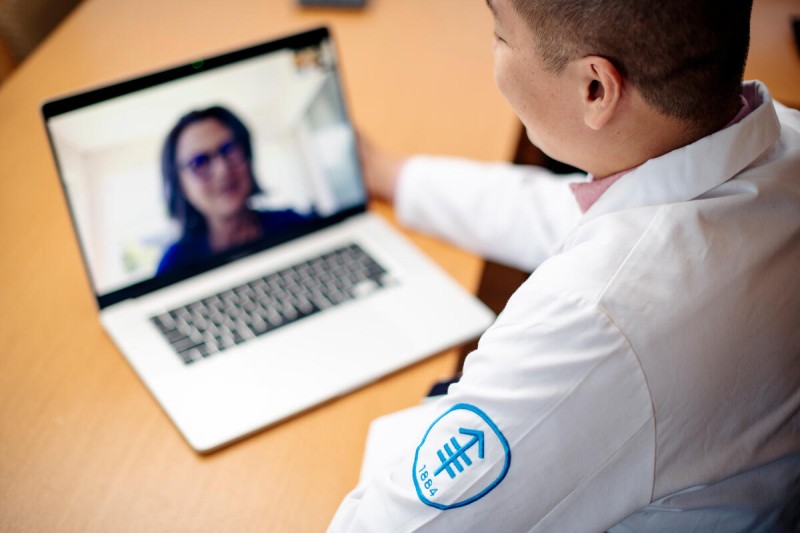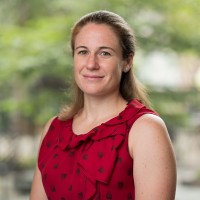

The MATCHES (Making Telehealth Delivery of Cancer Care at Home Effective and Safe) Telehealth Research Center aims to build the evidence base necessary to establish best practices for telehealth-enabled cancer care. The overarching goal of the Center is to create a research hub that generates evidence, trains investigators, and develops the research methods required to ignite the field of precision cancer care delivery. We aim to develop a new paradigm in oncology—precision delivery—with the ultimate goal of matching individual patients with the most beneficial combination of clinic-based or telehealth-supported home-setting care.
Our specific aims are:
- Conduct impactful pragmatic trials of telehealth in oncology
- Analyze a large existing cache of multidimensional observational data characterizing telehealth utilization and outcomes
- Train investigators and equip them with the skills necessary to innovate within an evidence-based framework
- Integrate telehealth with other data streams and create and apply analytic methods to transform the field of precision care delivery
MATCHES is a part of the National Cancer Institute’s TRACE (Telehealth Research Centers of Excellence) initiative under the White House Cancer Moonshot. Funded by NCI grant #P50CA271357
Media and Press Coverage
- August 2024 Cure “How Patients With Cancer Can Prepare for Virtual Care Visits”
- June 2024 MSK “Cancer Care at Home: MSK Advances Lead the Field”
- May 2024 MSK “How MSK is Making Patient Care More Accessible”
- January 2023 Healio “NCI-funded centers study new ways to apply telehealth across cancer care”
- August 2022 Forbes “Telehealth for Cancer Care Receives $23 Million Research Funding Boost”
- August 2022 Health Leaders “NIH Announces 4 Telehealth Research Centers of Excellence for Cancer Care”
- August 2022 Inside Precision Medicine “NCI Funds Four NewCancer Telehealth Research Centers of Excellence”
- August 2022 NCI Press Release “NCI Awards $23 million to establish centers of excellence to study telehealth for cancer care”
Upcoming MATCH-Light Seminars
| CME | |||
|---|---|---|---|
| Dr. Virginia Sun | Telehealth and Cancer Survivorship | 2/4/25 3-4pm EST | Accredited for 1 AMA PRA Category 1 Credit |
| Dr. Heather Landau | BMT at Home | 3/18/25 3-4pm EST | Accredited for 1 AMA PRA Category 1 Credit |
Please contact [email protected] to be added to our PDL for seminar announcements.
Past MATCH-Light Seminars
| Andrew Hantel MD | Climate Impact of Tele-Oncology | Andrew Hantel, MD is an Instructor in Medicine at Harvard Medical School and faculty member in the Divisions of Leukemia and Population Sciences at Dana-Farber Cancer Institute and the HMS Center for Bioethics. He received his MD from Loyola University Chicago; trained in internal medicine, adult hematology/oncology, and medical ethics at the University of Chicago; and completed a post-doctoral fellowship in cancer population sciences at the Dana-Farber/Harvard Cancer Center. Dr. Hantel’s lab leverages health services and care delivery methods to address ethical dilemmas in cancer discovery and delivery. His current work focuses on equity in the contexts of research participation, artificial intelligence, and climate change | 10/22/24
|
| Roxana Dronca MD | Cancer Care Beyond Walls | Roxana S. Dronca, M.D. is a professor of Oncology at Mayo Clinic College of Medicine and Sciences, Director of Mayo Clinic Comprehensive Cancer Center, Florida Cancer Programs, and she also serves as a member of the Florida Executive Operations Team. During the COVID-19 pandemic, Dr. Dronca set up the Mayo Clinic Cancer CARE Beyond Walls program, which strives to create a new model of cancer care that integrates telehealth and digital technologies with traditional models of cancer therapy. The goal is to continue to provide high-quality cancer care that is responsive to the diversity of our communities and patient mix, inclusive of people from all racial, ethnic and cultural backgrounds, and be committed to address patient access into our facilities and mitigate health disparities | 7/16/24 |
| Manali I. Patel MD MPH | Profit Over People, Cost over Care: Partnering to Disrupt the Broken Health Care System for People with Cancer | Dr. Manali I. Patel is a Thoracic Oncologist and Health Services Researcher at the Stanford University School of Medicine and the Veterans Affairs Palo Alto Health Care System. Dr. Patel obtained her MD and MPH at UNC-Chapel Hill and completed her Internal Medicine residency, fellowship in Hematology and Oncology, and Master of Science in Health Services Research at Stanford University. Dr. Patel’s research involves evaluating systems-level and social factors that influence disparities in cancer and value-based care delivery. Her expertise lies in designing, implementing, and evaluating new models of cancer care delivery with academic, community, and VA oncology practices aimed to improve patient experiences with care, clinical outcomes, and reduce unwanted health care utilization and health disparities. | 5/3/24 |
| Jonas Paludo MD | Remote Patient Monitoring and Outpatient Management of Cellular Therapies | Dr. Paludo is an Assistant Professor, Hematologist/Oncologist and Associate Program Director of the Hematology/Oncology fellowship program at the Mayo Clinic in Rochester, Minnesota. At Mayo Clinic, he leads the CAR-T/Bispecifics remote patient monitoring initiatives. | 3/12/24 |
| Olga Perski PhD | Evaluating engagement with digital health interventions and the engagement crisis | Dr. Olga Perski is an interdisciplinary researcher and health psychologist practitioner, operating at the intersection of behavioral science and technology. Her research primarily focuses on developing, optimizing, and evaluating interventions for smoking cessation and alcohol reduction, with a preference for delivery through smartphone apps, chatbots, and virtual reality. Dr. Perski is interested in technology-enabled, real-time assessment and modeling of within-person processes, emphasizing “just-in-time adaptive interventions” to offer timely and tailored support. An advocate for Open Science, she serves as Co-Director for the Open Digital Health initiative, dedicated to scaling and sharing evidence-informed digital health tools. | 11/28/23 |
| Adrian Aguilera, PhD | Digital Health Equity and Access | Dr. Adrian Aguilera is an Associate Professor in the School of Social Welfare at UC Berkeley and the Department of Psychiatry and Behavioral Sciences at UC San Francisco (UCSF). Dr. Aguilera directs the (dHEAL) and previously directed the Latinx Center of Excellence in Behavioral Health. Dr. Aguilera’s research is focused on developing and testing technology-based interventions to address health disparities in low-income and vulnerable populations, with an emphasis on Latinx populations. Dr. Aguilera’s current work has focused on utilizing mobile phone technology to improve mental health interventions in primary care settings. | 10/17/23 |
| Shaalan Beg, MD, MS | Employing tele-oncology to improve access to clinical trials | Dr. Beg is vice president oncology, Science 37 and adjunct association professor, Hematology and Oncology, University of Texas Southwestern Medical Center. A storied researcher and oncologist, Dr. Beg came to Science 37 from the University of Texas, Southwestern Medical Center in Dallas, TX where he served as Medical Director for the Clinical Research Office at the Simmons Comprehensive Cancer Center and held the position of Director Gastrointestinal Medical Oncology and Associate Professor of Hematology and Medical Oncology.Nationally, Dr. Beg is a member of the American Society of Clinical Oncology (ASCO) and the ECOG-ACRIN Clinical Research Group, having held a number of committee positions in those organizations. He is a graduate of ASCO’s Leadership Development Program and has been a member of the Pancreatic Cancer Task Force of the National Cancer Institute (NCI) GI Cancer Steering Committee. | 9/12/23 |
| Kathi Mooney, PhD, RN | Use of tele-oncology in hospital at home models | Dr. Mooney is a distinguished professor at the University of Utah College of Nursing and co-leader of the Cancer Control and Population Sciences Program at the Huntsman Cancer Institute. Her research is focused on understanding and reducing morbidity from cancer and treatment-related physical and psychosocial symptoms. She designs and tests technology-enabled interventions to improve quality of life for cancer patients and their families. She evaluates new cancer care delivery models that add value. The aim is to improve cancer patients’ and their families’ outcomes through care delivered in their homes and communities including families living in rural and frontier settings. | 7/11/23 |
| Amy I. Laughlin, MD, MSHP | Building and rapidly scaling oncology treatment at home during the COVID pandemic | Amy Iarrobino Laughlin, MD, is a Medical Oncologist and Assistant Quality Officer at Orlando Health Cancer Institute in Orlando, Florida. She was previously a fellow in Hematology and Oncology at Penn Medicine and a PC3I Innovation Fellow. She completed her residency at the Hospital of the University of Pennsylvania during which time she was a member of the Healthcare Leadership and Quality Track with projects focused on inpatient oncology team communication and advance care planning. Her research interest is in optimizing and transforming cancer care, with particular focus on breast cancer and use of patient centered technology. | 5/23/23
|
Pragmatic Trials
MATCH-UP: Making Telehealth Delivery of Cancer Care at Home Effective and Safe- Upscaled Services Protocol
Status: Conducting pilots
Lead(s): Michael Morris, Erin Bange
Summary: This pragmatic trial will test a new solution for a major problem with telehealth—the continued centrality of the cancer center for even the most routine clinical needs. We hypothesize that our telehealth model, forged in the crisis setting of the COVID-19 pandemic, can be enhanced and expanded to better meet patients’ and clinicians’ needs through a new program, MSK@Home, in which cancer care becomes increasingly home based. MSK@Home is a complex, multi-component intervention, with a telehealth backbone plus at-home administration of treatments, laboratory assessments, and vitals signs. This cluster randomized controlled trial will evaluate MSK@Home versus usual care for patients with breast or prostate cancer in MSK’s network of outpatient practices.
Status: Active
Lead: Bobby Daly
Summary: MATCH-IO extends the MSK@Home program to patients with advanced non-small cell lung cancer (NSCLC) who are receiving immunotherapy. The overarching goal of this pilot study is to improve the cancer care experience for patients receiving immunotherapy and for clinical leads by transitioning some components of treatment monitoring to patients’ homes. MSK-IO@Home will test whether in-person visits for ICB therapy q6wk (rather than q3wk), with interim telehealth toxicity checks between in-person treatments, is safe and effective relative to the standard q3wk infusions at in-person visits.
Aims:
- To evaluate the efficiency of MSK-IO@Home for patients with advanced NSCLC receiving maintenance single-agent ICB therapy
- To evaluate whether telehealth delivery of immunotherapy using MSK-IO@Home is safe, effective, and can meet the needs of high-risk groups
- To characterize patients’ and clinicians’ experiences of care during pembrolizumab therapy by telehealth and in-person visits and to assess preferences for visit types.
MATCH-Novel Pilot: Making Telehealth Delivery of Cancer Care at Home Effective and Safe for Novel Therapies
Status: In study start-up
Lead(s): Bobby Daly, Sahil Doshi
Summary: Small cell lung cancer (SCLC) is the most aggressive form of lung cancer with a median overall survival of just over 1 year and limited second line treatments for patients with advanced disease. Tarlatamab, a bispecific T-cell engager (BiTE) is a promising new immunotherapeutic approach. BiTE therapies have toxicity concerns related to cytokine release syndrome (CRS) and neurologic toxicity (including ICANS) requiring hospitalization for the first cycle of treatment. MATCH-Novel aims to investigate the use of a “Hospital at Home” (HaH) model with an enhanced telemedicine platform to improve access to this emerging therapy. The intervention will consist of coordinating a thoracic oncology telemedicine visit, at home paramedic visits, and vital sign and lab testing at home, to monitor for toxicity concerns within the first 24 hours post-infusion.
Multidimensional Retrospective Data Projects
Status: Active
Lead: Kathy Panageas
Summary: The MATCHES (Making Telehealth Delivery of Cancer Care at Home Effective and Safe) Telehealth Research Center will perform integration and pre-processing of complex synchronous and asynchronous data, data harmonization for telehealth evaluation and development of novel research methods. The overall goal of the Center is to optimize and personalize telehealth care delivery for cancer patients and survivors by deploying a novel intervention for cancer care delivery at home. The major tasks of this retrospective protocol are to 1) synthesize complex multimodal, multilayer asynchronous and synchronous data from trial data and MSK-wide data; 2) develop common data elements and facilitate data sharing across the Center; 3) track, manage, and analyze data on processes and outcomes of telehealth implementation, as well as clinical-effectiveness outcomes; 4) perform quality-control and coordination of all data use; 5) develop an analytic pipeline for digital biomarker discovery.
Aims:
- To assemble an observational database by integrating synchronous and asynchronous data for the development of research methods in telehealth.
- To develop an analytic pipeline for digital biomarker discovery.
- To explore patterns of telehealth use by patient, clinician, and clinic site factors.
- To explore the effect of telehealth on key clinical outcomes such as overall survival, health care utilization, quality of life, and safety
Clustering-Informed Shared-Structure Variational Autoencoder for Missing Data Imputation in Large-Scale Healthcare Data
Leads: Yuan Chen, Yasin Charvadeh Khadem
Summary: Despite advancements in managing healthcare data, missing data challenges persist in Electronic Health Records (EHR) and patient-reported health data, compromising their usability in various healthcare analytics. As Artificial Intelligence (AI) modeling techniques evolve, conventional and contemporary methods for handling missing data encounter notable limitations that hinder their effectiveness. Established methods such as Multiple Imputation by Chained Equations (MICE), MissForest, and Generative Adversarial Imputation Nets (GAIN) demonstrate limitations in handling the complexities inherent in healthcare data. These challenges involve capturing complex non-linear relationships, extended computation times, and constraints in addressing various types of missing data mechanisms. In response, we propose a novel model building on the Variational Autoencoder (VAE) architecture, a powerful generative model using Bayesian neural networks. Our proposed method differs from existing VAE-based imputation strategies by providing a robust framework specifically designed for handling missing values within healthcare data. This framework can effectively accommodate various missing data mechanisms, including missing not at random (MNAR). By identifying missing data patterns and leveraging shared structures across VAEs for different patterns, our model effectively captures complex associations, thus enhancing generalizability and learning efficiency. Through comprehensive simulation studies, we showcase the adaptability of our approach across different missing mechanisms, demonstrating its superiority over traditional and popular imputation methods in terms of imputation accuracy. We apply our proposed method to EHR data from patients diagnosed with early-stage breast cancer who are at high risk of recurrence after surgery at Memorial Sloan Kettering Cancer Center, specifically among those treated with the FDA-approved drug abemaciclib, which necessitates routine blood monitoring at specific time intervals due to potential side effects. Given the variability in clinical practices for ordering these tests, our approach aims to mitigate the impact of missing data on patient health monitoring and subsequent analyses.
Aims:
- The deliverables of this supplement will be multiply-imputed data sets that are ready for ML/AI applications as well as analysis pipelines that will be shared following the data sharing plans of MATCHES. We also anticipate the methods and algorithms developed during the course of this supplement will be helpful for others who deal with missing data in large-scale healthcare datasets.
Selected Publications
December 2024
Feasibility and Acceptability of Home Phlebotomy for Patients with Cancer
November 2024
Perspectives on Telemedicine Visits Reported by Patients with Cancer
July 2024
Transforming Patient-Centered Cancer Care Using Telehealth: The MATCHES Center
July 2024
A Framework for Integrating Telehealth Equitably (FITE) Across the Cancer Care Continuum
May 2024
Digitally Enabled Transitional Care Management in Oncology
April 2024
Remote Monitoring and Data Collection for Decentralized Clinical Trials
February 2024
Telemedicine and Cancer Care: Barriers and Strategies to Optimize Delivery
October 2023
Persistence of Telemedicine Usage for Breast and Prostate Cancer after the Peak of the COVID-19 Pandemic
September 2023
Honing in on the Hospital-at-Home Model
June 2023
Telemedicine as patient-centered oncology care: Will we embrace or resist disruption?
April 2022
Reimagining patient-centric cancer clinical trials: a multi-stakeholder international coalition
Enhanced Telemedicine Resources
Telehealth Visits
At-Home Vital Sign Monitoring
Self Administration of Injection Medications
People
Center Leadership

Prostate Cancer Section Head, Genitourinary Oncology; Steven A. Greenberg Chair in Prostate Cancer Research

Attending Biostatistician; Director, Research Support

Chair, Department of Medicine, George J. Bosl Chair at Memorial Sloan Kettering Cancer Center

Chief Health Informatics Officer
Members

Assistant Attending Physician

Research Biostatistician II

Assistant Attending Biostatistician

Qualitative Methodologist

Assistant Attending Physician

Chief, Biostatistics Service

Associate Member

Senior Research Biostatistician

Associate Attending Physician

Research Biostatistician II

Director of Biostatistics Computer-Intensive Support Services
Fernanda C. G. Polubriaginof, MD, PhD
Gilad J. Kuperman, MD, PhD
Fellows
Sahil Doshi, MD, Hematology/Medical Oncology
Yasin Khadem Charvadeh, PhD, Biostatistics
Staff
Charlotte Malling, Senior Project Manager, MATCHES Telehealth Research Center
Jennie Huang, Project Manager, MATCH-Novel
Kat Marcinkowski, Research Project Associate, MATCH-UP
Andrea D’Agostino, Senior Project Coordinator, MATCH-IO
Advisory Board
Cookie Fremong-Ntiri, DNP
Jessie Holland, MSN
Devika Gajria, MD
Scott Freeswick PharmD, MS
Melissa Lee-Teh, PharmD
Chasity Walters, MSN, PhD
Monika Shah, MD
Carol L. Brown, MD
Ankit Chabra
Cynthia McCollum
Karen Collum
Jennifer Tota
Carol Cincotta